
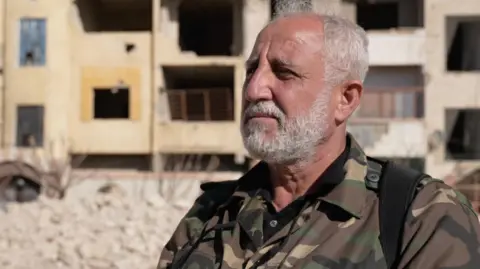 British Broadcasting Corporation
British Broadcasting CorporationRussia and Syria have been important partners for years – Moscow has gained access to air and sea bases in the Mediterranean, while Damascus has received military support in its fight against the rebels.
Now, with the fall of Bashar Assad’s regime, many Syrians want to see Russian troops leave, but their interim government says it is open to further cooperation.
“The crimes Russia committed here are indescribable,” said Ahmed Taha, a rebel commander in Douma, six miles northeast of the capital Damascus.
The city was once a prosperous place in the area known as the “bread basket” of Damascus. Ahmed Taha, a former civilian, was a businessman when he took up arms against Assad’s regime in 2011 after a brutal crackdown on protests.
The entire residential area of Douma is now in ruins as Syria’s nearly 14-year civil war has seen some of the fiercest fighting.
Moscow entered the conflict in 2015 to support the retreating regime. Russian Foreign Minister Sergei Lavrov later claimed that Damascus was just weeks away from being overrun by rebels at the time of the intervention.
The action in Syria shows that Russian President Vladimir Putin wants to be taken more seriously after his annexation of Crimea was widely condemned by the international community.
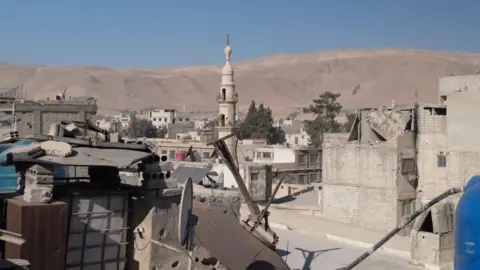
Moscow claims to have tested 320 different weapons in Syria.
It also secured 49-year leases to two military bases on the Mediterranean coast, Tartus Naval Base and Khmeimim Air Base. This allowed the Kremlin to rapidly expand its influence in Africa, serving as a springboard for Russian operations in Libya, the Central African Republic, Mali and Burkina Faso.
Despite support from Russia and Iran, Assad has been unable to prevent the collapse of his regime. But Moscow offered him and his family asylum.
Many Syrian civilians and rebel fighters now see Russia as an accomplice of the Assad regime that is helping to destroy their homeland.
“Russians came to this country to help tyrants, oppressors and invaders,” Abu Hisham said as he celebrated the fall of the regime in Damascus.
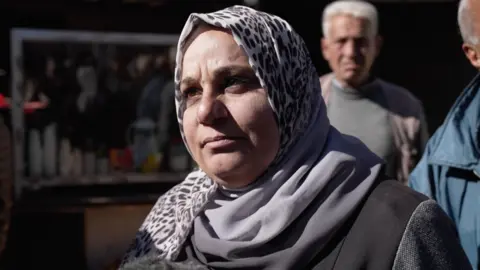
The Kremlin has always denied this, saying it only targets jihadist groups such as Islamic State or al-Qaeda.
But the United Nations and human rights groups accuse the regime and Russia of war crimes.
The UN report said that in 2016, during an attack on densely populated eastern Aleppo, Syrian and Russian forces carried out relentless air strikes that “claimed hundreds of lives and reduced hospitals, schools and markets to rubble.” “.
In Aleppo, Douma and elsewhere, regime forces surrounded rebel-held areas, cut off food and medicine supplies and continued bombing until armed opposition groups surrendered.
Russia has also negotiated ceasefires and agreements to surrender rebel-held towns, such as Douma in 2018.
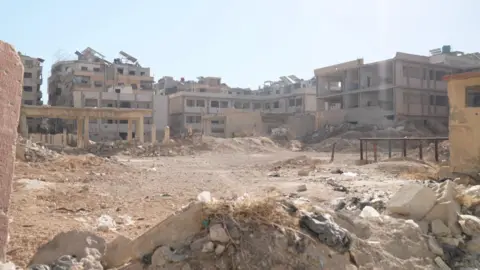
Ahmed Taha was one of the rebels there who agreed to surrender in exchange for safe passage out of the city after a five-year siege by Syrian forces.
In December, he returned to Douma to take part in a rebel offensive led by the Islamist group Hayat Tahrir al-Sham (HTS) and its leader Ahmed Salad.
“Despite Russia, despite the regime and all those who support it, we are back home,” Taha said.
He has no doubt that the Russians should leave: “For us, Russia is the enemy.”
Many people we spoke to echoed this sentiment.
Even leaders of Syrian Christian groups that Russia has sworn to protect say they have received little help from Moscow.
In Damascus’s ancient Christian district of Bab Touma, the Syrian Orthodox bishop said: “We have no experience of Russia or any other outside world protecting us.”
“The Russians are here for their own interests and goals,” Ignatius Afram II told the BBC.
Other Syrian Christians are less diplomatic.
“When they first came in, they said: ‘We are here to help you,'” said a man named Assad. “But instead of helping us, they are destroying Syria even more.”
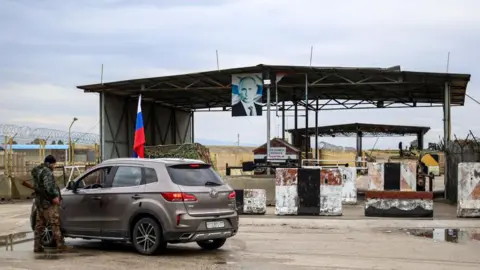 AFP
AFPSyria’s current de facto leader Salas said in a statement In an interview with the BBC last month, he said He did not rule out allowing the Russians to stay, describing the relationship as “strategic”.
Moscow seized on his words, with Foreign Minister Lavrov agreeing that Russia “has a lot in common with our Syrian friends.”
But untangling this relationship may not be easy in a post-Assad future.
Defense analyst and retired Syrian general Turki Hassan said rebuilding the Syrian army will either require a fresh start or continued reliance on Russian supplies, which would at least mean some kind of relationship between the two countries.
Hassan said Syria’s military cooperation with Moscow predates the Assad regime. He explained that virtually all the equipment it had was produced in the Soviet Union or Russia.
“From the beginning, the Syrian army has been equipped with weapons from the Eastern Bloc.”
According to Russian estimates, Syria received around 5,000 tanks, 1,200 fighter jets, 70 ships and many other systems and weapons from Moscow between 1956 and 1991, worth more than $26 billion (£21 billion).
Much of this is to support Syria’s war with Israel, which has largely determined the country’s foreign policy since independence from France in 1946.
When the Soviet Union collapsed, more than half of it was outstanding, but President Putin wrote off 73% of the debt in 2005.
For now, Russian officials are taking a conciliatory but cautious approach to the interim rulers who toppled Russia’s long-time allies.
Vassily Nebenzia, Moscow’s special envoy to the United Nations, said recent events marked a new phase in the history of what he called “the brotherly Syrian people.” He said Russia would provide humanitarian aid and reconstruction support to allow Syrian refugees to return home.








